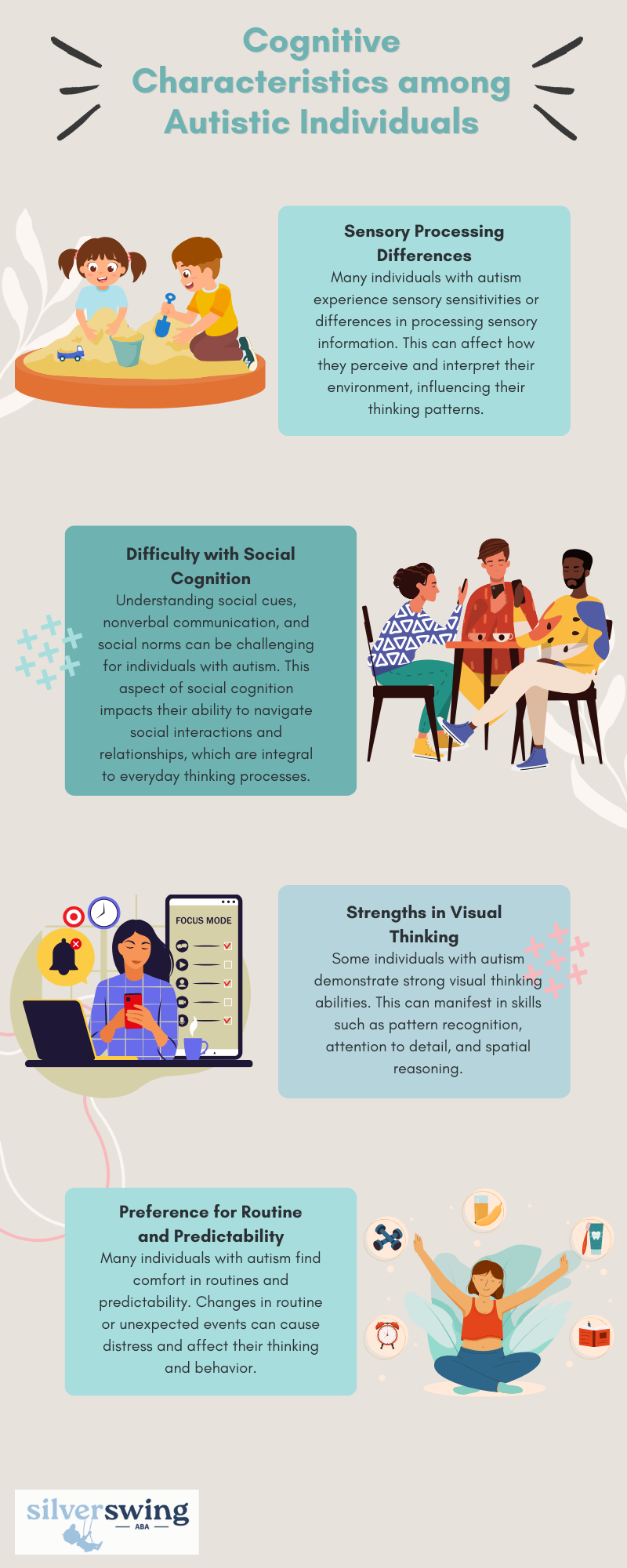One of the key aspects of autism is its impact on thinking processes, which can manifest in various ways across different individuals. Understanding these effects is crucial for supporting individuals with autism and promoting their cognitive development.

Theory of Mind and Empathy
Theory of Mind refers to the ability to understand that others have beliefs, desires, intentions, and perspectives different from one’s own. Individuals with autism often have challenges with Theory of Mind, which can impact their ability to predict and understand other people’s thoughts and feelings.
This difficulty in empathizing and understanding others’ perspectives is a significant aspect of how autism affects thinking in social contexts.
Studies have shown that compared to neurotypical individuals, those with autism may rely more on factual information rather than social cues when making judgments or decisions. This cognitive style can affect how they perceive and interpret social situations, influencing their social interactions and relationships.
Cognitive Profile of Autism
Autism affects thinking primarily through its impact on cognitive processes. While the spectrum is wide and diverse, certain cognitive characteristics are commonly observed such as:

Executive Functioning
Executive functioning refers to a set of cognitive processes that regulate, control, and manage other cognitive processes. These include things like:
- Planning and Organization – Individuals with autism may have difficulties in planning and organizing tasks, which can affect their ability to initiate and complete activities effectively.
- Flexible Thinking – Rigidity in thinking is a common characteristic of autism. Difficulty in adapting to changes or shifting attention from one task to another can impact problem-solving skills and overall cognitive flexibility.
- Impulse Control – Some individuals with autism may experience challenges in inhibiting inappropriate behaviors or responses, which can affect their ability to regulate their actions and make decisions.

Language and Communication
Language and communication skills vary widely among individuals with autism. While some may have strong verbal abilities, others may have limited or absent speech. Communication challenges can affect thinking processes in several ways through:
- Expressive Language – Difficulty expressing thoughts and ideas verbally can impact how individuals with autism communicate their needs, preferences, and emotions.
- Understanding Language – Some individuals may have challenges in understanding figurative language, sarcasm, or abstract concepts, which can affect their comprehension and interpretation of information.
Special Interests and Intense Focus
Many individuals with autism develop intense interests in specific topics or activities. This focused attention can be a strength, as it often leads to deep knowledge and expertise in particular areas.
However, this intense focus can also limit attention to other tasks or topics, which ends up affecting broader cognitive development and social interactions.
It’s essential to recognize that autism is characterized by cognitive heterogeneity, meaning that cognitive strengths and challenges vary widely among individuals. While some individuals may excel in certain cognitive domains, others may face significant difficulties in similar or different areas.
Understanding this variability is crucial for providing personalized support and interventions tailored to individual strengths and needs.

Sensory Processing and Cognitive Functioning
Sensory processing differences are a hallmark of autism, impacting how individuals perceive and integrate sensory information from their environment. Research indicates that sensory sensitivities in autism can affect cognitive functioning in several ways including:
- Over- or Under-Responsiveness – Some individuals with autism may be hypersensitive to sensory stimuli, such as loud noises or bright lights, which can lead to distraction or distress. Others may be hyposensitive, seeking out sensory stimulation to regulate their arousal levels.
- Impact on Attention and Focus – Sensory sensitivities can influence attentional processes, affecting an individual’s ability to focus on tasks or engage in social interactions. For example, sensitivity to background noises may make it challenging to concentrate in noisy environments like classrooms or public spaces.
- Integration of Sensory Information – Difficulties in integrating sensory information cohesively can affect cognitive processing speed and accuracy. For instance, challenges in filtering irrelevant sensory input may lead to difficulties in prioritizing and responding to relevant information.
Studies have shown that sensory processing differences in autism are associated with altered brain connectivity patterns and neural responses to sensory stimuli. These findings underscore the intricate relationship between sensory processing and cognitive functioning in individuals with autism.

Language and Communication Challenges
Language and communication impairments are prevalent among individuals with autism, ranging from delayed speech development to atypical language use and comprehension difficulties. These challenges can significantly impact cognitive processes related to communication and social interaction:
- Pragmatic Language Skills – Difficulties in understanding and using language in social contexts can affect how individuals with autism interpret social cues, make inferences, and engage in reciprocal conversations.
- Literal Interpretation – Some individuals may have a tendency to interpret language literally, which can lead to misunderstandings or difficulties grasping abstract concepts and figurative language.
- Echolalia and Scripted Language – Repetitive use of language, such as echolalia (repeating words or phrases) or scripted speech (repeating memorized phrases), may limit expressive language skills and flexibility in communication.
Studies indicate that early intervention programs focusing on communication and language development can enhance cognitive and social outcomes for children with autism. Augmentative and alternative communication (AAC) strategies, visual supports, and structured language therapies are among the approaches used to promote language acquisition and functional communication skills.
Autism influences thinking through diverse cognitive processes, including sensory processing, executive functioning, language and communication, and special interests. Recognizing the complex interplay between these cognitive domains is essential for designing effective interventions and support strategies that cater to individual strengths and challenges.
By fostering understanding, acceptance, and tailored support, we can promote cognitive development, social inclusion, and quality of life for individuals with autism across the lifespan.
Continued research into the cognitive mechanisms of autism will further enhance our understanding and ability to support individuals with this unique neurodevelopmental condition.



